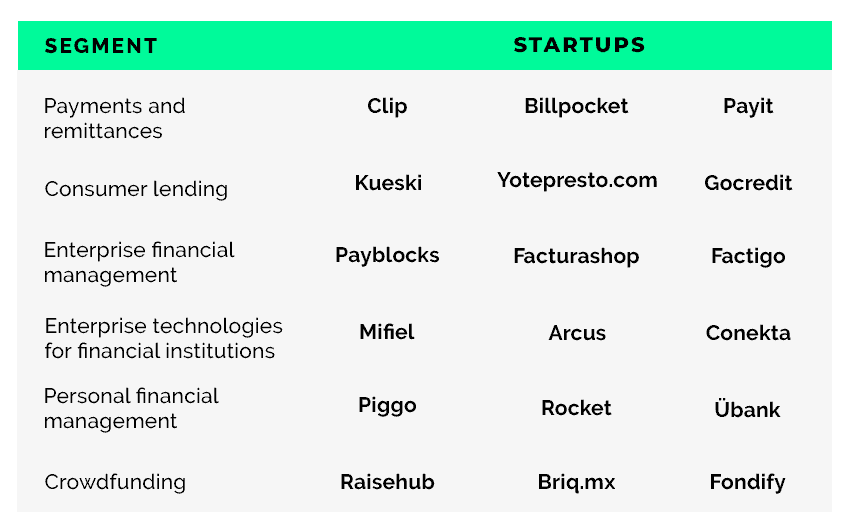
June 25, 2019
Written by: Roberto Aguilar and Fernanda Gutiérrez
Contxto – If you are considering expanding your fintech startup to, or already have a fintech in Mexico, there is a variety of reasons why this would make sense. From new legislation to untapped market potential, Mexico is not only pioneering the fintech industry in Latin America but the world.
First, let’s define what fintech startups do. Essentially, fintech startups are companies providing financial services through the use and implementation of new technologies. To accomplish this, many of them use the web, mobile applications, plus social media networks to streamline and simplify their care process.
Recently, Mexico has become one of the strongest fintech ecosystems in Latin America, based on recent legislation and market potential. Over the past few years, the country has also made huge advancements with fintech innovation. Due to this, Mexico has positioned itself as a fintech hub with high growth potential in Latin America and worldwide.
In the next lines, you will be able to understand (hopefully) the main aspects to consider about the financial industry in Mexico. Even more, international fintech startups may identify an opportunity for expansion into the Mexican market.
If you’re asking yourself: how do fintech startups improve the financial industry in Mexico? What are the current opportunities in the sector? How is the fintech ecosystem in Mexico? What is Fintech Law? Rest assured, you will find the answers you’re looking for within this article.
Let’s suppose you are the co-founder of a fintech company in Berlin that has launched operations in Germany and the UK. You are currently looking for opportunities to expand to new markets in Latin America. The first thing that catches your attention is that Mexico only has around 50 operable banks while there are more than 7,000 in the United States.
You then understand that Mexico’s banking system works like an oligopoly; there is no competition. According to the National Banking and Securities Commission (CNBV), only four banks concentrate approximately 68% of the financial market.
In addition, the National Report on Financial Inclusion 2018 from the National Banking and Securities Commission (CNBV) pointed out that less than 50 percent of Mexicans use banks. This means that most Mexicans do not have access to the financial system.
Another important factor is the average interest rate for personal loans, which was 25.5 percent at the end of 2018. Mexico’s financing is limited and expensive because the financial system is only accessible to those who have enough income to pay high interest rates.
The Federal Commission of Economic Competition (COFECE) states that “one of the main limitations for the entry of new players in the market is the minimum capital that is needed to constitute a bank in the country.”
In March 2018, the Fintech Law was created in Mexico. Since then, its main objective is to regulate Financial Technologic Institutions (fintech companies) and boost the creation of companies that provide financial services through technology and innovation. In turn, this will make financial services more efficient.
Hopefully, what you just read helps you better understand how the financial industry works in Mexico. Along those lines, some important factors to consider range from the existing bank oligopoly to high-interest loan rates. Furthermore, many Mexicans lack access to the traditional financial system.
According to the Inter-American Development Bank, digital technologies have played an important role in the evolution of financial inclusion. With so many unbanked individuals in Latin America, access to digital technologies represents a very important factor to increase financial inclusion. Additionally, the more access Mexicans have to financial services, the more incorporated they will be in the financial system.
Now, do you see the opportunity? If you are still not convinced, let’s talk about the market opportunity.
According to reports, Mexico is ranked as the best “Fintech Innovation Hub” in Latin America. The country registers an annual growth of 18 percent, in addition to 394 Fintech startups, Mexico positions itself as the undisputed leader for financial innovation in Latin America.
Not only has Mexico become an attractive country for Mexican fintechs to grow, but for others in Latin America. Out of any Latin American country, Mexico also attracts the greatest number of foreign startups.
According to the study “Reducing the use of cash and financial inclusion,” it is expected that within two years, 55 percent of cashless payments will be done through digital cards.
The Fintech Radar 2019, created by Finnovista, shows that the “Digital Banking” segment registers the highest annual growth at 200 percent. For many, this reflects the great interest and big opportunity present in Mexico. Some examples of Mexican digital banks include Flink, Albo and Hey.
In this section, we will further analyze the state of the fintech ecosystem in Mexico. We will point out the principal segments as well as the most valuable fintech startups the country has to offer.
As we pointed before, Mexico has made big advancements in the development of fintech innovation. The EY Consultancy places Mexico in the seventh position in terms of fintech adoption, with higher rates than Germany, the United States, France, and Japan.
The study Fintech Radar has also pointed out that the six principal segments in Mexico are:

The previous chart shows the six principal segments in Mexico as well as some examples of startups that are involved in the segment.
Actually, there are three Mexican startups that, due to their growth and high potential, are now considered as candidates to become the first fintech “unicorns” in the country. Konfío worth around US$102.8 million, Clip worth around US$42.3 million, and Kueski worth around US$38.8 million are the most valuable fintech startups in Mexico.
Konfio: is an online lending platform that helps micro-businesses in Latin America unable to access affordable loans.
Clip: through Clip, users can convert their smartphone (or even their tablet) into a bank terminal, accepting credit and debit payments anywhere, anytime.
Kueski: thanks to the use of big data as well as advanced analytics, Kueski offers micro-loans to users.
Due to the growth of fintech companies, the Mexican government created the Law to Regulate Financial Technology Institutions (Fintech Law). The regulation of this sector has made Mexico a pioneer in terms of regulations, especially in Latin America.
Besides providing legal certainty through a legislative framework to fintech companies, the purpose of the law is all-encompassing. Specifically, it wants to establish guidelines to ensure fair competition between fintech ventures and financial institutions.
Fintech companies aren’t the only ones expected to benefit from this new law but also users. Ultimately, the law facilitates access to financial services that are not only complicated for many but super bureaucratic. Therefore, users will be able to invest through crowdfunding, have access to loans online, as well as secure better interest rates.
As previously mentioned, Mexico ranks as the most influential Fintech Innovation Hub in Latin America. It is also considered one of the Fintech Hubs with the highest potential and growth worldwide.
To conclude, these aforementioned reasons have positioned Mexico as an attractive destination for foreign fintech startups. One clear example is that fintech companies, such as Nubank and Branch, have decided to expand their operations in Mexico. Let’s learn more about them.
Nubank (Brazil): Nubank is a platform that offers digital financial services with transparent, humane and simple finances. David Vélez, CEO and founder, expects to increase and improve Mexico’s banking and financial offer through a more competitive scheme involving new players.
Branch (US): through its website and mobile application, Brach facilitates access to loans, anytime, anywhere. The only requirement is to fill out an application. In seconds, customers can receive a loan sent directly to their bank account.
If you are interested in expanding into Mexico or knowing more about the fintech ecosystem and Fintech Law, feel free to contact us any doubts or questions you might have.

Por Yanin Alfaro
February 17, 2026

Por Israel Pantaleón
February 17, 2026

Por Stiven Cartagena
February 13, 2026